I am presenting below a translation of an article from RIA Novosti (Russian Information Agency). The site, like almost al Russian site, both English-language and Russian-language alike, is blocked in the West, but is accessible through VPN. Alternatively, a repost the article in Russian can be read on Cont. This is not something that is reported in the Western MSM for the sole reason that the Western reporters are studiously looking the other way, like they were looking at Charly Hebdo in 2014 while Donbass was starting to bleed at the hands of the Kiev junta.
“Even foreigners are being captured”: what is happening in the port of Mariupol
Mariupol, the 13th of April, Victor Zvantsev.
The DPR troops blocked the port of Mariupol, where the surviving units of the Azov battalion took refuge. The enemy continues to snarl, but weaker and weaker — ammunition is running out. The nationalist leaders are trying to escape by air, and their subordinates are breaking through on the ground. This RIA Novosti report is about how the seaport was stormed and what its employees tell us.
Chopper with ammunition
Destroyed docks, a burnt—out cargo ship, wrecked loaders, mine shanks stuck in the asphalt – this is how part of the Mariupol port looks like, which came under the control of the republican forces the day before. Behind a long concrete pier, just a couple of hundred meters away, there are Ukrainian positions.
The pier serves as a shelter for gunners, spotters and tankers. After driving out from behind a concrete block, the T-72 turns the tower around, fires three shots and hides again. In response, mines fly, but they fall several tens of meters from the target.
“Although we are already in full control of the situation, the enemy is still strong,” says the shooter of a Separate brigade of the operational purpose of the DNR “Shram” (at his request, the call sign was changed). — A couple of hours ago, for example, our tank was hit. The crew was killed, and the vehicle burned down. We can’t wait for the Nazis to run out of ammunition.”
The Azovites, according to the fighters, are now fighting extremely economically — in a month and a half their reserves have been severely depleted. There are many depleted caches on the liberated territory. They prepared for the battles here for a long time and thoroughly.
“We have blocked all routes for the delivery of weapons: on land, water and in the air,” Shram continues. — The last attempt was made a week ago. We shot down a chopper that had flown in from Zaporozhye for the leadership of the battalion. The captured crew reported that before the evacuation they managed to throw boxes of ammunition, grenades and mines into the harbour.”
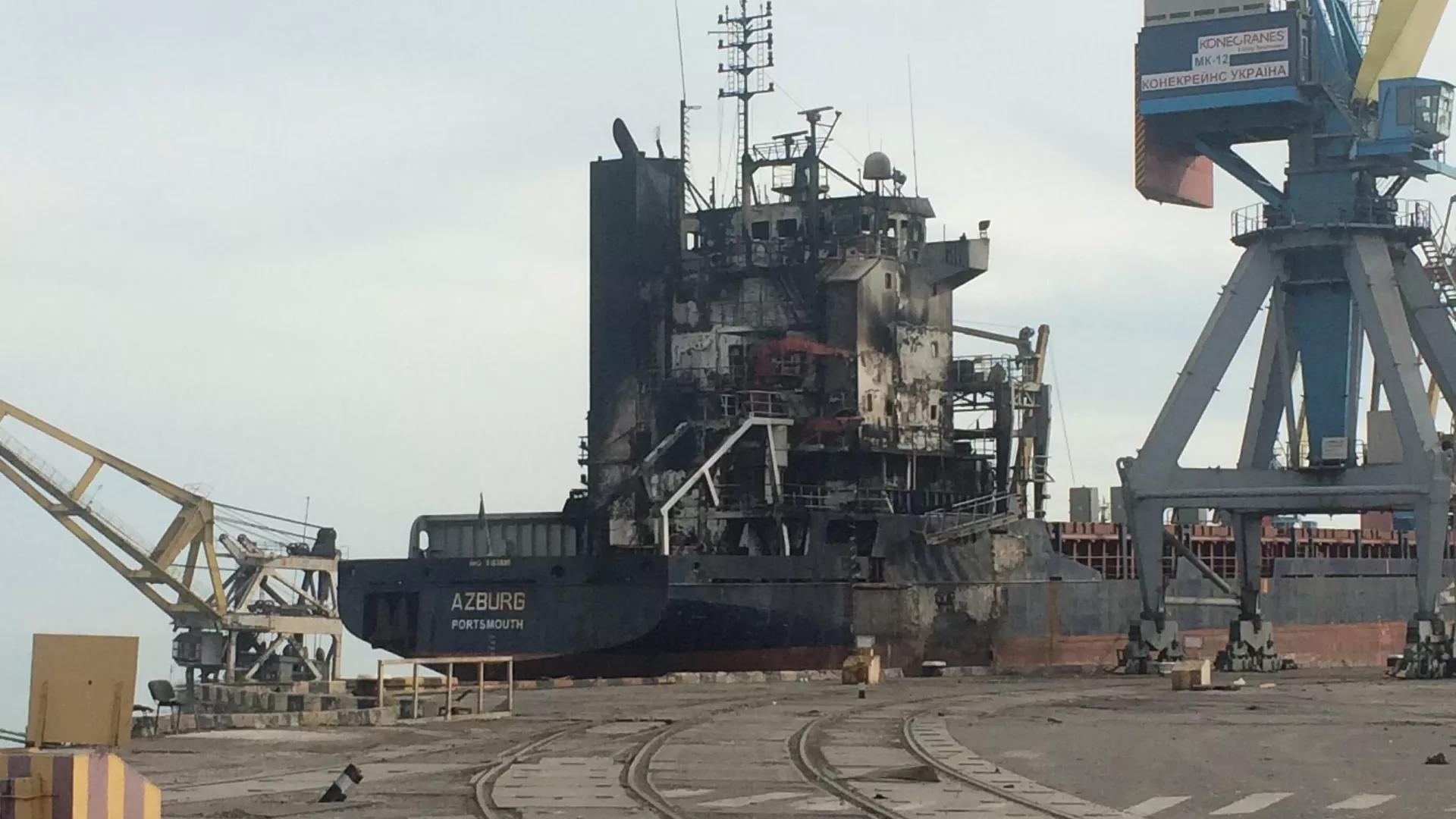
Mariupol port
Hostage situation
The attack on the port began on the first day of the military operation. The maintenance worker of one of the Mariupol companies Maxim Agapov remembers that morning very well. “It was just my shift,” he says. — As soon as the President of Russia made an address, they hit a military ship on the sixth berth, not far from the naval base. My partner and I were on the third.”
Maxim arrived from Gorlovka, worked on a shift basis — two weeks on, two weeks off. Together with colleagues, he rented a small private house in the historical part of the city next to the famous “House of Weeping Nymphs”, where the main Mariupol architect Viktor Nielsen lived a century ago.
“Azovites were quartered across the street,” Agapov recalls. — They didn’t tell the civilians that they could leave through humanitarian corridors. On the contrary, no one was allowed out. Some families still tried to get out, but the nationalists shot at their backs. I personally saw unarmed people being killed. One guy had half his head blown off.”
The mutilated corpse lay under the fence near Agapov’s house for several days. Because of the incessant fighting — the street was shot from all sides — they could not retrieve the body and bury him.
In the neighbouring courtyard, an even more shocking picture is the charred remains of a pensioner who was torn apart by a direct hit of a mine fired from a building where nationalists were hiding.
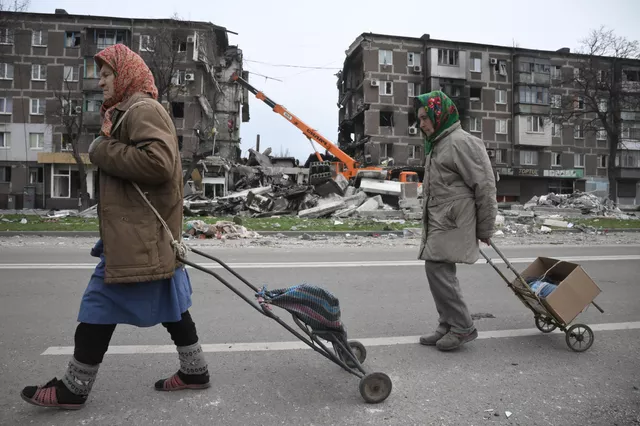
Residents of Mariupol are walking down the street of the city. In the background: employees of the Ministry of Emergency Situations of the DPR dismantle the rubble at the destroyed houses
“One came flying to us,” – Maxim points to the roof. — “Having broken through the ceiling, it got stuck between the stove and the sink. Luckily, it didn’t explode. We’ve locked the kitchen and are waiting for the sappers. And this morning, a sniper shot at us from a neighbouring five-story building. The Russian military liquidated him, but just as a precaution they asked us to sit out in the basement for a couple more days while the clean-up is underway.”
Maxim saw how, retreating towards the port, the nationalists changed into clothes taken from civilians and tried to blend in with the crowd of refugees.
He himself, while waiting for evacuation, helps elderly Neighbors: he carries water from the pump, bakes pancakes from the remains of flour, he heats the oven. “I want only one thing — to return home to my parents and my wife,” says the maintainer. — “I’m not sure that I will fully recover after everything I’ve been through. It was a real hell.”
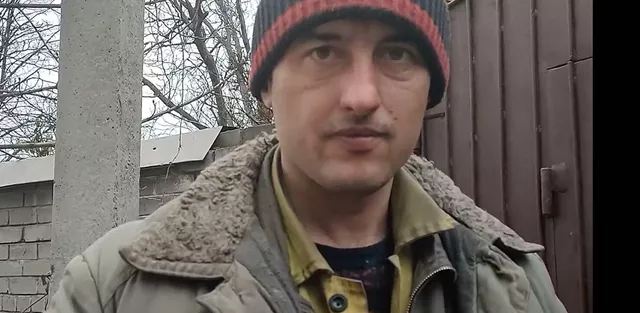
Maxim Agapov
Musicians and actors
The nationalists were being pushed to the seaport from several directions at once: from west, north-west and north. Both professional soldiers and those mobilized in mid-February participated in the street battles.
Among the recruits were artists of the Donetsk Opera and Ballet Theatre, as well as musicians of the local Philharmonic, advancing from the village of Mangush.
“Amazing people,” says the battalion commander of the 5th brigade of the DPR with the call sign “Nikolaich”. — One of them comes up: “I have cigarettes, I want to exchange them for an additional can of stew.” I answer: “Keep them for yourself, just take the jar.” He keeps saying, “No, I insist.” At this moment you realize that you are communicating with a real intellectual.”
Now the employees of the theatre and the Philharmonic control the private sector near the port, where there is still unrest. In the morning they go to the assault and clean-up, in the evening they gather around the campfire for dinner and remember their comrades — their colleague died in another clash the other day.
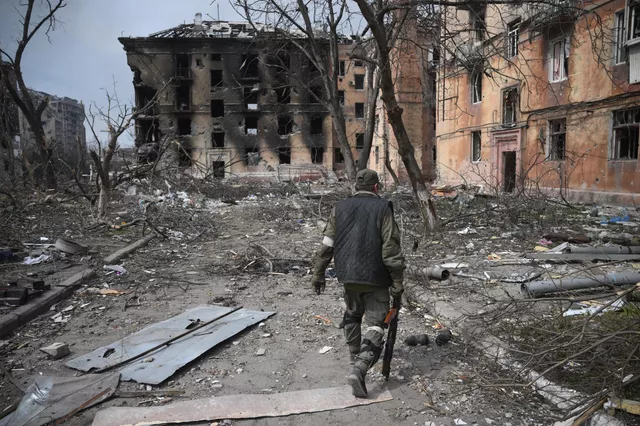
A serviceman of the People’s Militia of the DPR in Mariupol
“These guys amaze me, someone who have been fighting all my life,” Nikolaevich admits. “They understand that every day they can get an enemy bullet or a fragment of a mine, they see the dead and wounded, but they still do their job.”
The battalion commander tries to protect them. If possible, he leaves them in the rear. But war is war, victims are inevitable. “When we clean up the port to the end, we will send the guys back to Donetsk,” Nikolaevich promises.
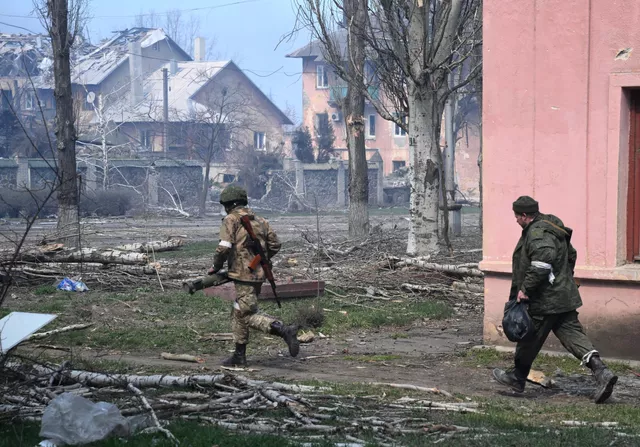
DPR NM servicemen on the front line in the Left Bank district of Mariupol
A Captain from Odessa
In the port, according to the military, the scattered formations of Azovites have dug in. And even here they continue to hide behind civilians. And not only local ones.
“25 people have been released from that ship over there,” Shram points to the transporter moored to the pier. — The captain is from Odessa, the rest are Europeans and Americans. They were not allowed to go out, kept as a human shield. Everyone was taken to filtration to find out if they were really sailors.”
The MGB checks almost everyone who finds himself in the port and the surrounding area. After all, it is clear that the defeated nationalists will try to cheat. Many Azovites have fake certificates of employees of the harbour or other urban enterprises.
According to the command of the DPR army, Mariupol is almost completely cleared, but in some areas, mainly in the industrial zone, three or four thousand Ukrainian soldiers are hiding. How much time and effort it will take to force them to lay down their weapons and come out with their hands up, the officers do not yet undertake to predict.
